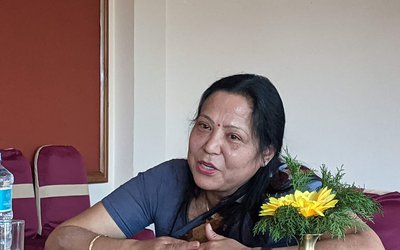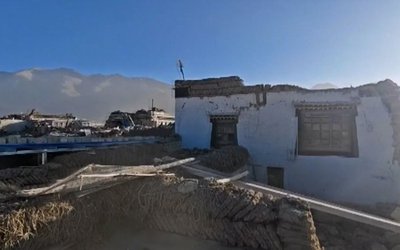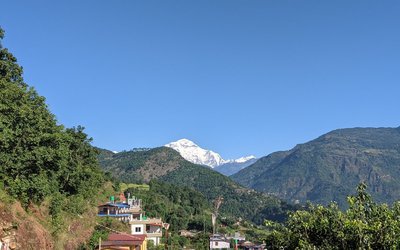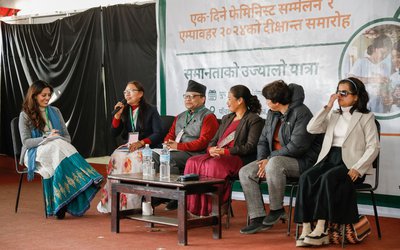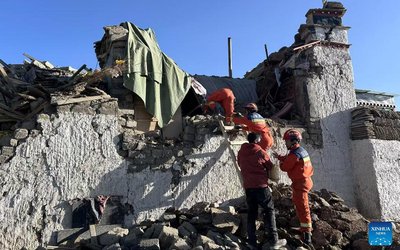
As Nepal and Israel established their diplomatic relations 58 years ago, how do you see the state of their bilateral relations at present?
I am very happy to be here as the Ambassador of Israel to Nepal. This is my second assignment in Nepal. I had served in 1998 for ten months as Charge d'Affaires a.i. My predecessors have contributed in promoting the bilateral relations with their excellent works and I am following them. The relations are excellent and very well kept in both sides. Your ambassador in Israel and I both have been working closely to strengthen our bilateral relations.
How do you see Nepal’s migrant workers in Israel?
We have been employing Nepalese mainly as caregivers. Since last few years, every year 500+ young students are going to Israel to participate in 11 months long advanced agriculture training 'Learn and Earn' in cooperation with Sana Kisan Bikas Bank. The students study and practice in agriculture sector. They go to college once a week and do practical work for 5 days for which they also get paid. They save quite some amount of money when they come back. The most important of this program is that the students learn about the modern Israeli agriculture system. Upon coming back, they form a group and engage in farming using the Israeli know-how and experience.
How do you assess this learn and earn program? As the program provides support to the offspring of poor and marginalized farmers of remote Nepal, how does Israel see it?
Our partner for this project is Sana Kisan Bikas Bank and we are working together excellently. This Bank's only agenda is to help the farmers of Nepal. I see this program is very important for Nepal to retain youths in the country by engaging them in agriculture profession. According to the findings based on a study done by scholars of Israel, from Tel Aviv University, the big challenge of this program is to ensure its follow-up. Once the students come back, it is the responsibility of the Government of Nepal to monitor them whether they are going to farm in their villages and applying the knowhow and knowledge acquired in Israel in over 11 months. This monitoring is very necessary. For this follow-up, the government of Nepal needs to work closely with Sana Kisan Bikas Bank and the Embassy.
What prospects do you see for this program in Nepal?
At a time when one of the big challenges of government of Nepal is to improve the quality and quantity of its agriculture products, this program provides the much needed exposure and skills to Nepalese farmers to grow more. If 2 or 3 percent of population in Israel produce enough food for Israel and even export, Nepal can also do it.
How do you see the policy makers view it?
As 66 percent of Nepalese are involved in the agriculture sector, there is a need to reduce this number to 50 percent within four-five years. This is the ambition, I have found, in Finance Minister Dr. Yubaraj Khatiwada. It is very ambitious but it is possible. What you need is good partners and one of them could be Israel with its knowhow for efficient agriculture system. I firmly believe that this program can make some contribution to it.
How do you see the recent visit of Minister of Agriculture to Israel?
The Honourable Minister Chakrapani Khanal visited Israel during Agritech 2018 which was held on 8-10 May 2018. It was an international agriculture fair and Israel holds it every three years. This gives an opportunity to our partners from abroad to see what Israel can offer to them if they need to improve their agriculture. I believe that such a high-level visit can contribute in promoting agriculture development cooperation between the two countries.
How else can Israel help Nepal in its agriculture development?
We have a beautiful project in India under which we are opening excellence centers. We can also do the same in Nepal and copy it here as well. Those projects in India are fully financed and owned by the Indian Government. These projects proved very successful in India to improve the agriculture sector. If the government of Nepal is willing to do it, we are ready to sign a MoU and our main contributions will be transfer of knowhow and capacity building. It is up to the government of Nepal to make the first step and show its willingness to a project like that of India in Nepal.
How do you see the trend of the students?
Not all of them who come back from Israel necessarily engage in farming. Even if we assume 30 to 40 percent return to agricultural profession, it is a great success. By now, 2200 students have already come back and soon there will be five hundred more returnees within a few weeks. There will be 2700 and another 540 going on this year’s quota. We have already signed visa in the Embassy. Can you imagine after ten years of this activity the growing numbers from one year to the other you will have some eight to ten thousand Nepalese who have been in Israel to know about the modern agriculture system using high quality fertilizers, seeds, drip irrigation and green houses, etc. This will certainly make a great difference.
How does this all help Nepal?
The students will definitely help Nepal as they can use all the technologies they learned in Israel in order to enhance their capacity of production not only quantity but also quality. I think in the long-run, Nepal may not have to import agriculture products from India and elsewhere, rather it may export them to India and China as well. Nepal has the potential for this. Nepal has fertile land, hardworking people and good climatic conditions. You may need some kinds of knowhow and innovation that we have already developed in Israel.
Israel has been providing all kinds of necessary support to Nepal at the time of major disaster and crisis including the humanitarian support given during 2015 earthquake, how do you see the possibility of expanding such cooperation between the two countries?
Actually, we do not come here only in urgency. We did similar operations in many other countries and Nepal was a recent case of 2015. Within 72 hours of the earthquake, a full-fledged hospital established by Israeli Defense Forces came into operation to help the victims, which was very much appreciated by the Government and the people of Nepal.
We also help through various capacity building trainings organized by MASHAV-Israel's Agency for International Development Cooperation of the Ministry of Foreign Affairs. We provide courses in Israel as well as in Nepal. Unfortunately, Israel has a lot of experiences of dealing with mass casualties. Following the earthquake, we provided training to Nepalese officials, from Police, Army and para medics in Israel. We understand the importance of preparedness for this kind of situations. If there is a demand from the government to train 20-30 people for a period of 2-3 weeks we can do it and we can also bring Israeli experts to Nepal and choose the time and place to do it.
Since its establishment Israel has been facing terrorism acts and violent threats, how does Nepal respond when such issues come to the international forum?
Since we have a very good relationship in a bilateral level with Nepal, we are expecting that the government of Nepal would be on our side whenever such things may occur. It also happens in international arena, in the United Nations organizations may it be in New York, Geneva, Vienna and Rome and so on. When there are voting on the situation of Middle East, we are hoping that Nepal will take a position which will be more balanced, not being necessarily pro-Israeli, we respect the priority of the government and its ideology and logical positions. We do respect that each and every nation is sovereign and taking decisions according to its interest. There is no doubt about it but we would like to see more friendly and sympathetic position of Nepal towards Israel when it comes to the decision that might put Israel in an embarrassing situation especially in the context of Israeli Arab conflict and Israeli Palestinian relationship.
What more do you expect?
We are expecting Nepal to reflect its excellent bilateral relations with Israel into international arena to show that we are friends. If you cannot vote for us, at least please do not vote against us. If there are possibilities in between either for or against, you can either abstain or absent. Please make use of one of them whenever possible. We appreciate from time to time whenever it is possible, for the Nepali foreign policy to show a more friendly attitude towards Israel on the international arena.
Since Nepal and Israel are both small countries with so many commonalities of interest and hostile global situation in taking risk, how do you look at this?
We never forget in Israel that Nepal was the first country in South Asia to recognize Israel and establish diplomatic relations with us. We highly value it. We know that Nepal belongs to the non-aligned movement and you have other considerations too. But we still believe that there is a margin of tolerance of moving from one side to other, not dramatically like America, Australia, and Canada. We have to be realistic about global politics and we do respect Nepal as a member of non-aligned movement and so on. This is totally clear to us but we still believe that there is a room for some maneuver and come closer to our positions, sometimes. Your policy is friend to all, nobody is enemy. We believe in Jerusalem and here in the Embassy, you can be still more balanced. We don’t want to see your country pro-Israeli or Pro-Palestinian but please show your friendship to us when it comes to the United Nations.
What is the caregiver issue now?
We are under a pilot project to take care givers. There is a goodwill in Jerusalem regarding increasing the numbers of caregivers. Israel is considering signing another pilot agreement with Nepal for taking 500 caregivers under G2G agreement. As many Israeli are getting older, there is the need for more caregivers and Nepalese have won the hearts of Israelis. I can tell you that Israelis say Nepalese caregivers seem to be the best compared to those we are getting from other countries in South Asia and elsewhere. The quality of Nepalese caregivers is excellent as they become the members of the family. They adjust with the family. The image of Nepalese caregivers is so positive that they are asking for more Nepalese caregivers. I can tell you Nepalese caregivers in Israel are earning more than a Nepali working in other countries in the Middle East. We are so thankful for their services. There are lots of possibilities to increase the number.
Israel celebrated 70 years of Independence and 60 years of the Establishment of MASHAV with 'Wheelchairs of Hope', do you have any plan to support Nepal’s people with disability in future as well?
This is one of the initiatives of the Embassy of Israel. Usually most of the cases, we as well as other embassies host national day reception in hotels with formal programs. However, we have decided to use the national receptions budget for humanitarian causes making children with disabilities happy with wheelchairs. We hope that such humanitarian works help further strengthen relations between Nepal and Israel at the people to people level in the long term. For us these forty children will be enjoying with these wheelchairs for years from now. We thought it will be a rather better contribution to the needy people who may not be able to afford those chairs. Our Ministry accepted the Embassy's idea. Hope we will continue this kind of activities in the future too. There are so many humanitarian issues like disabilities, eye ailments, etc. etc. We hope the Embassy can contribute for more such noble works.

Keshab Poudel
Poudel is the editor of New Spotlight Magazine.
- The Question Arises: Do Former Prime Ministers Prachanda, Nepal, And Dr. Bhattarai Support The Terror actions Of Hamas?
- Dec 11, 2024
- MD KUL MAN GHISING: December 25 Deadline For Upper Tamakoshi
- Dec 09, 2024
- ADB's REFP Reintegration of Returnee Migrants
- Dec 02, 2024
- The Relationship Between Kosovo And Nepal Is Robust: ELBERT KRASNIQUI
- Nov 29, 2024
- ADB’s REFP: Women (Em)Power
- Nov 28, 2024





